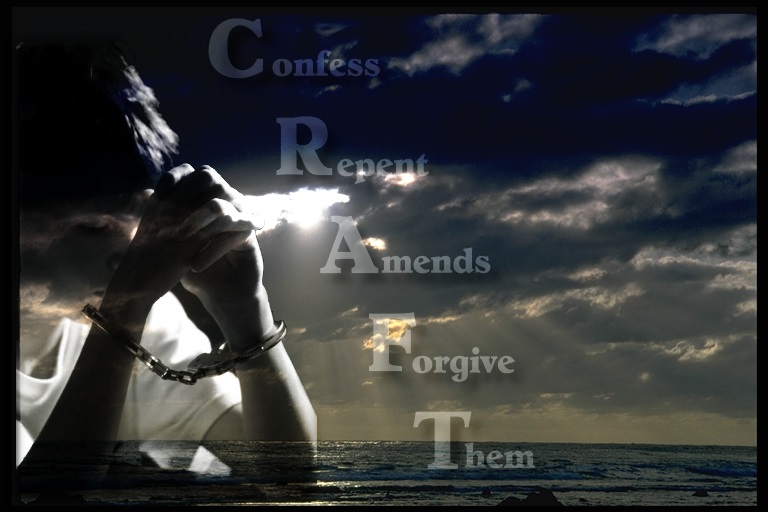

Law #3: Confess, Repent, Make Amends and Forgive ThemÖthe CRAFT of Forgiveness
 Sin
at first feels liberating, but it gradually enslaves us. At first it feels
good to drink abusively without worrying about the consequences. But, if you
ever want to see slavery, watch an alcoholic trying to stop on his/her own
power. It is the same with all other sins, they promise you great things, but
there is always a hidden cost. They gradually and silently enslave you.
Freedom is never easy, but it is impossible until we realize that we have been
enslaved and resolve to fight for our freedom.
Sin
at first feels liberating, but it gradually enslaves us. At first it feels
good to drink abusively without worrying about the consequences. But, if you
ever want to see slavery, watch an alcoholic trying to stop on his/her own
power. It is the same with all other sins, they promise you great things, but
there is always a hidden cost. They gradually and silently enslave you.
Freedom is never easy, but it is impossible until we realize that we have been
enslaved and resolve to fight for our freedom.
In addition to the slavery sin causes us, the chains of confinement are also very heavy. They weight us down, wear us out, and eventually make our life miserable. Guilt is the burden we bear when we continue to sin. We can gain some relief by making excuses, but this is not unlike taking morphine to deaden the pain of our hand on a hot stove. You may not notice the pain if the dose is strong enough, but the damage is still being done. Just as the correct solution to the last example is to take your hand off the stove, the correct way to deal with sin is to stop sinning.
 The first step
to freedom from sin is to admit that we have done something wrong. This is not
easy because it means we have to give up our morphine, which in this case is all
the excuses we have made to escape our guilt. When we accept responsibility for
our wrongs the guilt hits us head on. But after the pain there comes a
wonderful release when we experience Godís forgiveness and at that point the
damage stops. We have to be careful not to accept too much responsibility as
well as too little (see the serenity prayer above).
The first step
to freedom from sin is to admit that we have done something wrong. This is not
easy because it means we have to give up our morphine, which in this case is all
the excuses we have made to escape our guilt. When we accept responsibility for
our wrongs the guilt hits us head on. But after the pain there comes a
wonderful release when we experience Godís forgiveness and at that point the
damage stops. We have to be careful not to accept too much responsibility as
well as too little (see the serenity prayer above).
 Confessing is also
not as easy as it sounds because it inevitable leads to the second stage, which
is to repent...or resolve not to commit the same sin again. This often involves
having to give up something very cherished, often what used to be our god...and
this is extremely traumatic.
Confessing is also
not as easy as it sounds because it inevitable leads to the second stage, which
is to repent...or resolve not to commit the same sin again. This often involves
having to give up something very cherished, often what used to be our god...and
this is extremely traumatic.
 Repentance, though
painful, is tremendously liberating. But, it still may not be able to entirely
remove our guilt. If we have stolen some money, and repent, but continue to
keep the money, we are in effect still committing the same sin. The obvious
answer here is to give back the money we have stolen. Making amends is called
for in most cases unless doing so will cause more harm.
Repentance, though
painful, is tremendously liberating. But, it still may not be able to entirely
remove our guilt. If we have stolen some money, and repent, but continue to
keep the money, we are in effect still committing the same sin. The obvious
answer here is to give back the money we have stolen. Making amends is called
for in most cases unless doing so will cause more harm.
 Making amends is
often extremely painful and embarrassing, but practicing it helps us to avoid
the same mistakes in the future. After we have gone through the pain of making
amends we will think twice before committing the same sin again.
Making amends is
often extremely painful and embarrassing, but practicing it helps us to avoid
the same mistakes in the future. After we have gone through the pain of making
amends we will think twice before committing the same sin again.
 Godís
forgiveness is beyond description. It removes chains and weights that have been
burdening us and gives us a feeling of freedom and purity that is more than I
can describe. God loves us and wants to restore us. But, the restoration
cannot be complete if we continue to wear the chains of hatred and vengeance.
If God forgives us our sins, it only stands to reason that we should forgive
those who have wronged us. This does not mean we have to accept ongoing abuse
from others or completely hold others unaccountable for wrongs that they should
make amends for. However, it does entail completely letting go of hatred and
resentment and even replacing it with love. This is not something that always
happens over night. Turning off years of resentment is not easy, but the person
who benefits most from this is the person giving up the resentment.
Godís
forgiveness is beyond description. It removes chains and weights that have been
burdening us and gives us a feeling of freedom and purity that is more than I
can describe. God loves us and wants to restore us. But, the restoration
cannot be complete if we continue to wear the chains of hatred and vengeance.
If God forgives us our sins, it only stands to reason that we should forgive
those who have wronged us. This does not mean we have to accept ongoing abuse
from others or completely hold others unaccountable for wrongs that they should
make amends for. However, it does entail completely letting go of hatred and
resentment and even replacing it with love. This is not something that always
happens over night. Turning off years of resentment is not easy, but the person
who benefits most from this is the person giving up the resentment.